

All the while weary of our insufficiencies and reservoirs of experience in bad decision making.It is perhaps the most tumultuous and stressful time in anyone's life.
Stress Test. HAMILTON ANXIETY. What is stress. [1] Centre for Studies on Human Stress.
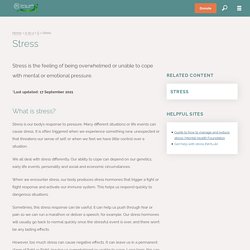
Recipe for Stress: Retrieved on 4 Apr 2018 from: [2] Segerstrom SC & Miller GE (2004) Psychological Stress and the Human Immune System: A Meta-Analytic Study of 30 Years of Inquiry. Psychological Bulletin, 130, 601-630. [3] American Psychological Association. Stress: Retrieved on 20 April 2018 from: [4] Adamo SA (2014) The effects of stress hormones on immune function may be vital for the adaptive reconfiguration of the immune system during fight-or-flight behaviour. . [5] The Physiological Society (2017) Stress in Modern Britain. . [6] Hammen C (2005) Stress and Depression. . [7] Stroud, CB, Davila J & Moyer A (2008) Journal of Abnormal Psychology, 117, 206-213. [8] Bonde JO (2008) Psychosocial factors at work and risk of depression: a systematic review of the epidemiological evidence.
. [9] Health Executive Agency (2017) Work-related stress, depression or anxiety statistics in Great Britain 2017. 11 Signs and Symptoms of Too Much Stress. Stress is defined as a state of mental or emotional strain caused by adverse circumstances.
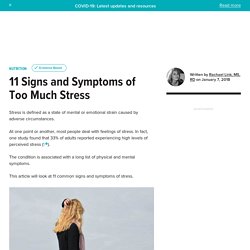
Stress effects on the body. Musculoskeletal system When the body is stressed, muscles tense up.
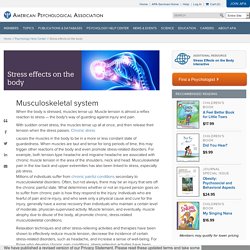
Muscle tension is almost a reflex reaction to stress — the body's way of guarding against injury and pain. With sudden onset stress, the muscles tense up all at once, and then release their tension when the stress passes. Chronic stress causes the muscles in the body to be in a more or less constant state of guardedness. Millions of individuals suffer from chronic painful conditions secondary to musculoskeletal disorders. Relaxation techniques and other stress-relieving activities and therapies have been shown to effectively reduce muscle tension, decrease the incidence of certain stress-related disorders, such as headache, and increase a sense of well-being.
Respiratory system The respiratory system supplies oxygen to cells and removes carbon dioxide waste from the body. Stress may harm gut health as much as junk food. (1) Physical effects of stress. Albrecht's Four Types of Stress. © iStockphotofotoVoyager Deal with four common types of stress. Imagine that you work in human resources, and that you've recently been dealing with a lot of people problems. It's been another long day. You're now meeting with your last "client" before you go home. As you listen to this person's story, you start to get tense.
Rather than taking your frustrations out on this person, however, you apologize and ask for a five-minute break. Columbia River Mental Health Services. Stress management can be complicated and confusing because there are different types of stress — acute stress, episodic acute stress, and chronic stress — each with its own characteristics, symptoms, duration and treatment approaches.
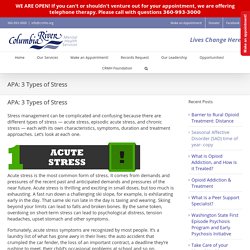
Let’s look at each one. Acute stress is the most common form of stress. It comes from demands and pressures of the recent past and anticipated demands and pressures of the near future. Acute stress is thrilling and exciting in small doses, but too much is exhausting. A fast run down a challenging ski slope, for example, is exhilarating early in the day. Fortunately, acute stress symptoms are recognized by most people. Because it is short term, acute stress doesn’t have enough time to do the extensive damage associated with long-term stress. There are those, however, who suffer acute stress frequently, whose lives are so disordered that they are studies in chaos and crisis.
Problem solving strategies. What not to do. Why Be Honest? Source: But aren't there good reasons to be honest even when we don't think we need to be?
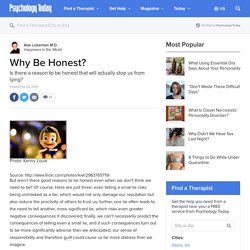
Of course. Here are just three: even telling a small lie risks being unmasked as a liar, which would not only damage our reputation but also reduce the proclivity of others to trust us; further, one lie often leads to the need to tell another, more significant lie, which risks even greater negative consequences if discovered; finally, we can't necessarily predict the consequences of telling even a small lie, and if such consequences turn out to be more significantly adverse than we anticipated, our sense of responsibility and therefore guilt could cause us far more distress than we imagine. article continues after advertisement Though many may agree these are all compelling reasons not to lie and could probably themselves come up with other excellent reasons I haven't mentioned, we still all do it.
I might argue in most circumstances such as these, however, it's still better to tell the truth.